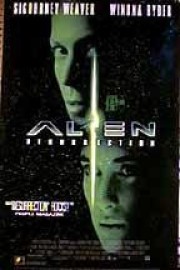Alien: Resurrection
Watching it for the first time in nearly 15 years, “Alien: Resurrection” remains a fascinating oddity in the “Alien” franchise. I still think that David Fincher’s “Alien3,” the theatrical cut of which the director disavowed, is the worst film in the series– well, unless you include the unwatchable “Alien vs. Predator” films –but many people would disagree with that assessment. Roger Ebert is one of them, as he said in his 1997 review, “There’s not one shot that fills us with a sense of wonder.” Joss Whedon is another, and he’s had nothing but negative things to say about what director Jean-Pierre Jeunet did to his screenplay (and as the writer, I’m inclined to trust his assessment, especially considering that I’ve become familiar with his unfiltered voice over the years, starting with the “Buffy” TV show that debuted the same year as this film).
With all due respect to both of those personal heroes, however, I disagree with them. Certainly, the film doesn’t hold a candle to Ridley Scott’s 1979 classic, or James Cameron’s 1986 sequel, but while the film has an unmemorable musical score (at least, when it isn’t recycling Jerry Goldsmith’s iconic music from the original), and certainly has serious issues in tone (likely due to Frenchman Jeunet not quite understanding Whedon’s idiosyncratic writing style), “Alien: Resurrection” has a juicy sci-fi premise that maintains a lot of Whedon’s typical, subtextual intellect, and is NOT bereft of images that are worthy of comparison to the first two films.
It’s important to remember that, at the time of the film’s release, real-world science was making remarkable strides in the realm of cloning and other, controversial practices. Cloning is not the hot-button issue it was at the time, but that part of “Resurrection,” which is responsible for the rebirth of Sigourney Weaver’s iconic character, Ellen Ripley, in this film, delivers some of the most powerful moments in the film, especially when we get a glimpse of the government’s previous attempts to clone Ripley.
There’s another bold issue at play in “Resurrection,” however, that is just beneath the surface, as the newly-reborn Ripley and what’s left of a scientific team, as well as a band of smugglers, try to get off of a military ship where everyone’s favorite, multi-mouthed alien is on the loose after the smugglers have delivered a dozen human subjects for the scientists to implant with the alien’s leathery eggs. Key to Whedon’s real subject in his script is the character of Call (Winona Ryder), who arrives with the smugglers, but is really here to kill Ripley before the scientists extract the alien that she was impregnated with at the end of “Alien3.” (Spoiler alert: She’s too late.) That description right there should tip your hat that what Whedon was really exploring the abortion issue, and indeed, the choices characters are forced to make between life and death for others throughout the film back up that interpretation. This is the type of thing sci-fi is best at: dealing with real-world concerns in the trappings of a fantasy world. Really, though, the “Alien” movies have always dealt with this subject, at least indirectly, with the everymen in the movies looking at the larger implications for mankind, while the government take a morally-indefensible viewpoint, with scientific exploration getting in the way of “every human life being valuable.” Of course, that description right there makes it difficult to pinpoint sides in the debate, but really, that’s what makes the real-world topic so tricky– in the end, it’s anything but black-and-white.
As an action-packed thriller, which people started to expect from the series after Cameron’s film, “Resurrection” largely fails, although an extended, underwater chase has some of the film’s most striking images. But Jeunet and cinematographer Darius Khondji, who had collaborated earlier on the 1995 fantasy, “The City of Lost Children,” are much more interested in capturing a mood of primal dread that is akin to a hyped-up version of Ridley Scott’s original film. They don’t always succeed, but the film remains an entertaining visual trip, and between the always-superb Weaver and her chemistry with Ryder, as well as a cast of characters that include Jeunet regulars Ron Pearlman and Dominique Pinon and distinctive supporting actors like J.E. Freeman, Brad Dourif, and Michael Wincott, the film resonates with a fascinating sense of purpose of feeling it doesn’t get enough credit for. Maybe not everything got lost in the translation from Whedon’s words to Jeunet’s images.










